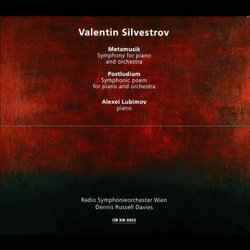| All Artists: Valentin Silvestrov, Dennis Russell Davies, Radio Symphonieorchester Wien, Aleksei (Alexei) Lubimov (piano) Title: Silvestrov: Metamusik; Postludium Members Wishing: 0 Total Copies: 0 Label: ECM Release Date: 6/24/2003 Album Type: Import Genre: Classical Style: Symphonies Number of Discs: 1 SwapaCD Credits: 1 UPC: 028947208129 |
Search - Valentin Silvestrov, Dennis Russell Davies, Radio Symphonieorchester Wien :: Silvestrov: Metamusik; Postludium
 | Valentin Silvestrov, Dennis Russell Davies, Radio Symphonieorchester Wien Silvestrov: Metamusik; Postludium Genre: Classical
Silvestrov is among today's most imaginative composers, whose music sounds like no one else's. Metamusik, from 1992, opens like a giant wave crashing onto a seashore, and as it recedes, orchestra and piano explore the ripp... more » |
Larger Image |
CD DetailsSynopsis
Amazon.com Silvestrov is among today's most imaginative composers, whose music sounds like no one else's. Metamusik, from 1992, opens like a giant wave crashing onto a seashore, and as it recedes, orchestra and piano explore the rippling echoes of its cataclysmic effect. These "ripples" are at first disturbing in their reminiscences of violent upheaval, but with repetition and dynamic variety take on a peaceful cast, and ultimately, a dreamy, mystical aura. Some of the work's episodes explore mini-aspects of that great opening event, as if the emotional impact is being remembered and explored. Subtitled "Symphony for piano and orchestra," Metamusik is in one long, large-scaled movement based on an earlier work, from 1984, Postludium, a "symphonic poem" for the same forces. Postludium is terse, more concentrated and colorful and employs greater contrasts. Both repay repeated hearings. Deceptively simple on its face, Silvestrov's music demands performers in tune with his highly personal aesthetic, and it gets them in these committed performances by Davies and his orchestra, and especially by Lubimov, a pianist who's long championed the composer's music. This disc is a must for anyone interested in contemporary music. --Dan Davis Similar CDs
|
CD ReviewsSublime mystery 07/02/2003 (5 out of 5 stars) "This is a very powerful, evocative pair of compositions. It is actually very hard to articulate what exactly is going on in these pieces, which is perhaps part of their beauty." Relaxing for contemporary music D. B. Rathbun | Washington, DC United States | 11/04/2003 (4 out of 5 stars) "The Metamusik for piano and orchestra was done in 1992, and recorded here in 2001. It's an interesting piece, and one that fits its title, though you would really have to hear it to get it. In short, the piece begins with a weaving of brass swells over a soundmass in the strings, with piano arpeggios, then transitions to a serene section of diatonic piano scales with orchestral caresses interspersed, something reminiscent of a Horner score, which transitions to stepwise melodies in strings somewhat like the Adagietto from the Fifth, then moving to smoothly atonal sections with piano arpeggios over brass/string soundmasses, and George Crumb-like leaky-sink repeated notes in the piano, switching to another serene treacly diatonic section with the piano, and so forth.RSO Wien plays well under Davies, though little of the orchestral or piano writing is technically challenging, but each executes the piece with depth and sensitivity, lending clarity to the architecture of the piece. For fans of contemporary music, it's worth listening to, somewhat like Giya Kancheli or even Rautavaara, if one could really draw comparisons; for those that despise modernism, it's still probably worth listening to, at least a few rungs better than Clint Eastwood's score for "Mystic River."" Sorrowful weight and emotive density scarecrow | Chicago, Illinois United States | 06/02/2006 (5 out of 5 stars) "it has become commonplace here to see the incredible weight of the East,where it is summoned from well the Soviet system seems to roll off everyone's tongues quite readily, as if the West hasn't created equal states of barbarism,via colonial-isms,financial collapses,.
Silvestrov's music requires concentration,it searches for meaning within itself like exploring yourself through the beauties you yorself define,nothing from the outside except via quoatation in abstracted shape in the textures and shapes of an abandoned place; this music has mystery ill-defined a hauntedness almost to the threshold of the vacuous,inhabiting its own places and time durations but of what we haven't a clue,on how this all proceeds, the pianist finds endless inspiration in this music's performance,like giving insight into a language you think you had known; is it music that speaks for all time? I don't know, it is music relegated to a particular time in cultural emotive shapes and values?,but the import seems to be fairly inconspicuous and metropolitan,the pesant experience is here only within the margins of places in timbre perhaps only; I don't know, it is a music that does however seem to be saying farewell to beauty,to an art,then is this piano & orchestra a beginning to something else; that was or will never be only in memory or through the artifice of art,through the piano and the orchestra.thwe word "meta" is explored for differing meanings, somewhat like Derrida's "trace" concept of something must still remain once you have questioned your materials to the point of their demise. The overwheming weight of gesture, a signature of the East is in the slowness of the music, it takes its own time, although it comes to the surface with Mahler-like melodic fragments,signifiers of dust and time worn away, time worn through,like a wood spot in a floor,now shining from overuse;the music is like particles chosen for beauty, flotsam,like drifting by in the water,like in one of Eco's novels; floating by the quiet shores of contemplation wherever that might be.Perhaps they register a past violence, an atrocity that had already occurred; You can listen to both works here as continuations of each other for the musical materials resemble each others emotives realms. The piano seems to be accompanied in register by the violins in high register, a known beauty, Silvestrov seems to be saying we cannot allow freedom to have too much space,self-indulgent, gratuitous; so the piano is on a leash much of the time,watched in a panoptikon way; although it is allowed a parcelled space of beautiful arpeggios harp-like,its own reveries to itself,not finding its own voice but of another's Other; melodic in the tonal world, but it is all non functional for the music has its own agenda of contemplation.A Time warp; You feel beauty at work yet with contingencies and reservations, like beauty if "occupied" by another, an unexplained force-field not allowed to live within one's own breath,with one's breath;within one's own breathing spaces. Silvestrov's music is too atmospheric in a large gradiose sense to be poetic,there is no poetry here; his music hardly explores details,the miniature moment is mortgaged to whatever is larger within the work,all the music comes to be dependent on its large slow continuation into spaces, large expanses of space,like emotive drones of forgotten melos. There are suggestions as well of childhood memories, where dependence comes to be situated in toys, dolls that cannot return words when spoken to,like Esther's narratives in Dickens,she knows she is not good at dealing with problems and societal commonplaces,she cannot speak to people always; so Silvestrov as well, escapes into his own resonant realms,always tonal for he reserves the atonal the chromatic for more struggle-bound arguments. There are overwhelming densities not physical ones ones only the slwoness of musical line brings and summons to the orchestra, Russell Davies and Vienna play beautifully without reservation. There doesn't seem to be much argument on what one can and may do with this music, it is self-evident in its shapes and structures,its time cannot be altered or played with; that is perhaps its most modern features,it is not music for children; that it simply remains contented with itself not promuligating any technical discourses.The music imparts no new knowledge of timbre,it depnds on past experiences of music you have already heard and lived. This is music that bears repetition,however but not contemplation past itself.It is not a music that comments too far myopic within itself,although this music has a universal content at times,in times. It looks at the globe sheltered from itself by a body of water, an alpine lake, a timbre, a shape, a melodic line heard prior by someone, we don't know whom. it looks." |

 Track Listings (2) - Disc #1
Track Listings (2) - Disc #1

